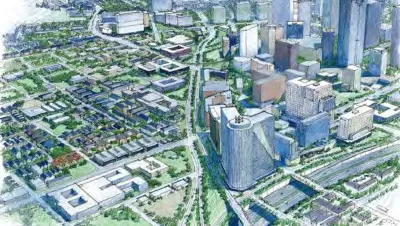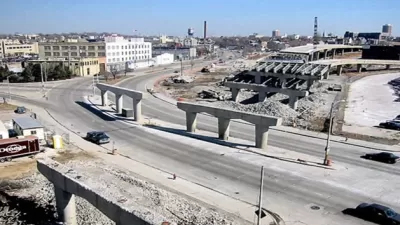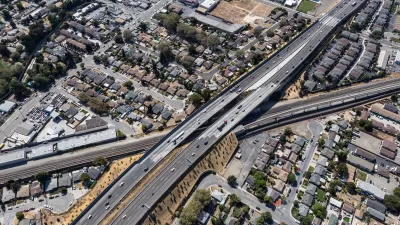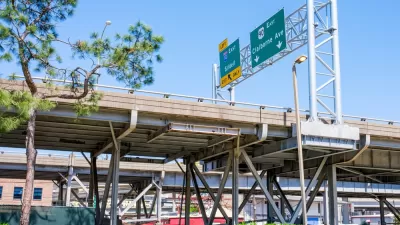The case for freeway in urban areas isn't as unequivocal as it might seem. Plans to undo the damage of the legacies of past freeway planning need to ensure an inclusive future.

An article by Sarah Digiulio, produced by Kaiser Health News and published by the Los Angeles Times, details the ongoing effort by federal lawmakers to provide new funding and programs to rip out some of the urban freeways that bisected and severed neighborhoods during the 20th century (although highway projects with similar consequences are still in planning stages in some parts of the country to the present day).
"Today, as many of these roadways near or pass the end of their intended lifespans, policy makers, social justice advocates and urban planners have called for them to come down," explains Digiulio
However, the article isn't unequivocal about the benefits of removing freeways. The example of the Mandela Parkway—"a four-lane boulevard enhanced by a median with trees and a curving footpath, stretches along a 24-block section of West Oakland"—is cited as evidence of how freeway removal projects (in this case the Cypress Freeway, which collapsed in the Loma Prieta Earthquake of 1989) can improve air quality and offer amenities and other quality of life improvements while also spurring gentrification and displacement.
Jennifer Wolch, a professor of city and regional planning at UC Berkeley is cited in the article describing the ambivalent effects of such projects as "green gentrification."
Her research, focused on the overall public health effects of urban greening, shows that rising housing costs and displacement of longtime residents can also damage their health. Other research has found that residents from marginalized groups reported a lower sense of community after greening transformations.
Despite those cautionary tales, the freeway removal movement seems to be gaining speed has the support of the Biden administration. "[President Biden's] infrastructure plan calls for highway removal to right historical injustices and improve the health of people who live nearby. At least four bills in Congress would fund such efforts, though none is assured passage." Even Texas, where a plan to widen the I-95 in North Houston seems to double down on the freeway planning of the past, has begun a conversation about dismantling existing freeways, rather than building more.
One of the bills currently making its way through Congress, the Reconnecting Communities Act, would spend $3 billion to reconnect communities as a component of the larger, $715 billion INVEST in America Act, which recently cleared the U.S. House of Representatives and headed to the Senate. The Reconnecting Communities Act has already attracted the attention of planners and stakeholders in Baltimore, Philadelphia, and Atlanta.
FULL STORY: Biden has a plan to remove some freeways. Will it make cities more healthy?

Trump Administration Could Effectively End Housing Voucher Program
Federal officials are eyeing major cuts to the Section 8 program that helps millions of low-income households pay rent.

Planetizen Federal Action Tracker
A weekly monitor of how Trump’s orders and actions are impacting planners and planning in America.

Ken Jennings Launches Transit Web Series
The Jeopardy champ wants you to ride public transit.

Washington Legislature Passes Rent Increase Cap
A bill that caps rent increases at 7 percent plus inflation is headed to the governor’s desk.

From Planning to Action: How LA County Is Rethinking Climate Resilience
Chief Sustainability Officer Rita Kampalath outlines the County’s shift from planning to implementation in its climate resilience efforts, emphasizing cross-departmental coordination, updated recovery strategies, and the need for flexible funding.

New Mexico Aging Department Commits to Helping Seniors Age ‘In Place’ and ‘Autonomously’ in New Draft Plan
As New Mexico’s population of seniors continues to grow, the state’s aging department is proposing expanded initiatives to help seniors maintain their autonomy while also supporting family caregivers.
Urban Design for Planners 1: Software Tools
This six-course series explores essential urban design concepts using open source software and equips planners with the tools they need to participate fully in the urban design process.
Planning for Universal Design
Learn the tools for implementing Universal Design in planning regulations.
Heyer Gruel & Associates PA
Ada County Highway District
Institute for Housing and Urban Development Studies (IHS)
City of Grandview
Harvard GSD Executive Education
Toledo-Lucas County Plan Commissions
Salt Lake City
NYU Wagner Graduate School of Public Service





























